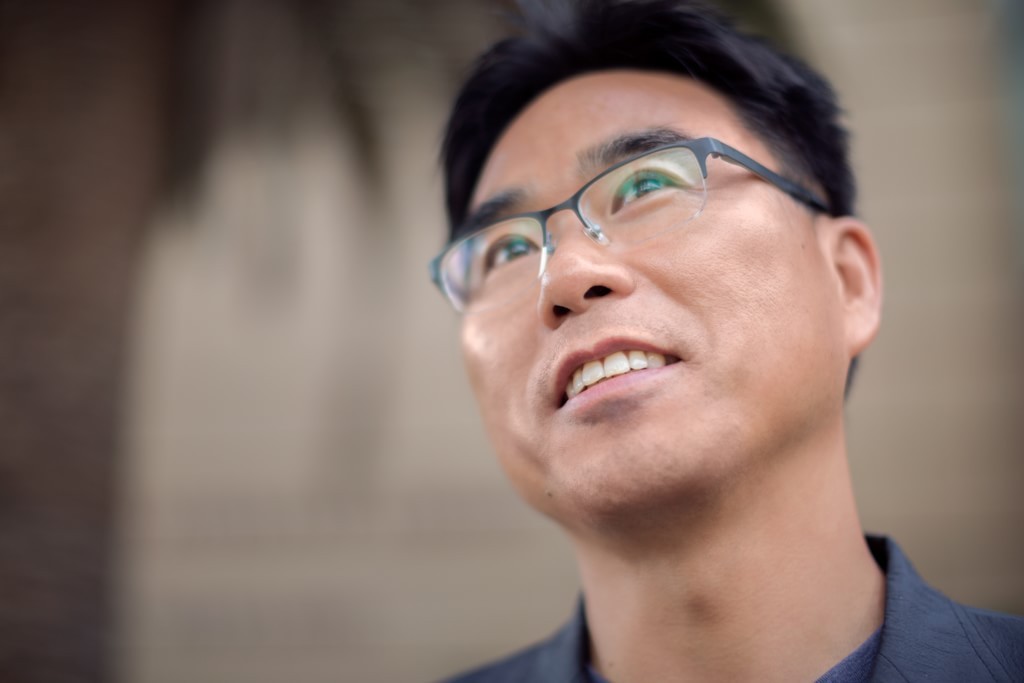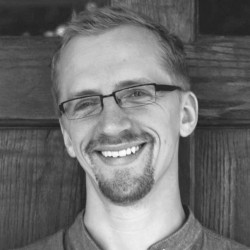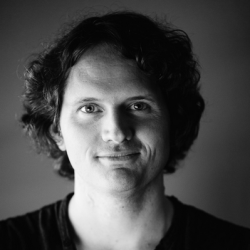
+ Photo from the middle of the Sinai Peninsula, courtesy of Jongjin Park.
When Jongjin Park first moved his family from Seoul to Cairo, his ministry experience and the MDiv he’d earned in Korea were matched by an unwavering conviction “to preach the gospel in Egypt and change their country.” He quickly learned that Islamic and state officials prohibited public preaching and that “the best way to minister is for them to see Jesus in me,” he recalls thinking. “I must proclaim the gospel with my behavior.” He began taking Arabic classes in the morning and practicing Arabic in open-air coffee shops until the evening—because, he says, “Without language how can I understand their culture? Learning the language says that I value them.” He took the Egyptian word Baraka, Arabic for “blessing,” as his own name, and more than a conversation starter, it was a reminder to him of how he wanted to treat the local community.
While his new name and desire to learn the language built quick rapport with locals, his friendships with Muslims rarely led to conversion, compelling Jongjin to join his fellow missionaries in turning his zeal for conversion elsewhere: “When we couldn’t convert Muslims, we thought that we should try to evangelize Coptic Orthodox Christians,” he remembers. If he was going to minister to them, though, he wanted to know more about their culture first.
As he immersed himself in the culture, his ability to understand and speak Arabic grew quickly, and after two years he met with the dean of the Institute of Coptic Studies at St. Mark’s Cathedral. He told the dean, “I want to know your form of Christianity from your perspective.” Impressed that an Arabic-speaking Korean missionary was interested in his faith tradition, the dean admitted him as the first foreign student in the institute. Every week Jongjin would pass the nave, enter the classroom, and learn about Coptic Orthodox history and theology, and what he learned surprised him: unlike his own missionary efforts, they had thrived in the Islamic context for centuries, prompting Jongjin to adjust his perspective. Coptic Orthodox Christians were currently under Islamic persecution, and they had been for 1,300 years—did they really need him to evangelize? How were they able to proclaim the gospel in this Islamic context? He confesses it was a turning point in his life: “Do I teach them or learn from them? Coptic Orthodox Christianity changed my paradigm for what it means to be a missionary.”
Jongjin went to Egypt intending to plant the seeds of the gospel, and he found that the gospel had been quietly flourishing for centuries. The Coptic Orthodox community weren’t people to convert, he saw; they were people to learn from, people to love: “This is a deep form of Christianity,” he says. “I saw that I needed to partner with the Coptic Orthodox Church, not try to evangelize it.” As he started attending worship services more regularly, he discovered a deep affinity and resonance with religious icons and monastic wisdom, ancient liturgies and contemplative prayer.
It was during that spiritually fertile time that his church in Korea advised him to leave Egypt. They told him that Cairo was too far from South Korea—that they couldn’t see enough visible growth to warrant Jongjin’s efforts. “There’s no fruit in Egypt,” they told him, and they encouraged him to move to a more receptive Asian culture. Jongjin says, “I understood their perspective, but how could I move to Asia when Egypt is my calling? I felt I had to show them tangible results.” He skipped his furlough to work with more direct missionary efforts, and he partnered with other organizations to develop productive evangelistic strategies. He worked like this for another two years—an approach his fellow missionaries shared: “We identified ourselves with our actions. We were trying to turn stones to bread.”
Six years after arriving, Jongjin was feeling both overworked and curious: why were these two mission paradigms so different? And why did Coptic monastic spirituality seem so sustainable? An older missionary and mentor insisted that he had to take a break, and that’s when Jongjin decided to come to Fuller. It seemed to him that a school of intercultural studies might be a space to rest and reflect, to ask hard questions in a safe, like-minded community.
When he arrived halfway around the world in Pasadena, California, it wasn’t long before his energy returned and a new desire to understand Coptic monastic spirituality took root. The more he studied, the more it confirmed a striking difference between the Protestant paradigm he had learned and a new way of understanding missiology: “Mission is not doing something for God but participating in the triune God. What is mission work? To abide in God.” For Jongjin, mission work was no longer about doing things for God but allowing the work to overflow from a deeper relationship with God.
He now uses each class as an opportunity to understand this difference between being and doing and “how Coptic monastic spirituality can inform mission as participation in God.” School of Intercultural Studies Dean Scott Sunquist has observed—and encouraged—his path at Fuller: “Talking to Jongjin, I find myself talking to a person who has been formed by a Korean missionary passion tempered by the attentiveness and silence of a Coptic monk. What makes all of this unique is that he has come to study monastic spirituality not as a distant observer, but from within as a participant.”
The more Jongjin learns, the more he sees his action-oriented missiological approaches as part of a larger problem of mission around the world. “Doing ministry without an understanding of God’s mission will only lead to burnout,” he stresses now. “We must minister from the true essence of ministry. Knowing God—and knowing the heart of God—has to be incarnated not just in our heads, but in our hearts.”
Now as a current PhD student, Jongjin balances his studying with weekly hikes in the mountains bordering the seminary with his wife, Mijung Lee, and when he feels homesick for Egypt, he listens to Arabic worship songs and visits local Coptic churches. Jongjin sees his education as part of his spiritual journey: “Why do I study? Why do I sit in this chair? It’s not to have a degree; it’s to learn to abide in God.” It’s a new approach to mission work and what he now sees as his second calling: to “be a vessel of God’s love” and to share with churches everywhere the unexpected fruits of Egypt.


한국교회에서 사역 경험과 신학대학원에서의 공부는 박종진 선교사가 가족과 함께 선교지인 카이로에 도착하여 “이집트에 복음을 전하고 그 나라를 변화시키 자”라는 확신을 갖기에 충분하였다. 하지만 곧 이슬람 국가에서는 공적으로 전도하는 것을 금하고 있음을 알게 되었고, 무슬림들에게 복음을 전하는 것은 “그들이 내 안에 있는 예수님을 보게 되는 것”과 “삶으로 선포하는 것”이라는 것을 깨닫게 된다. 박선교사는 “그들의 언어를 배우지 않고는 그들의 문화를 이해할 수 없으며 언어를 배운다는 것은 내가 그들을 존중한다는 것”임을 확신하며 아침에 아랍어 수업을 듣는 것으로 시작해 저녁까지 길거리 카페에서 아랍어를 연습하기 시작한다. 아랍어로 “축복”이라는 뜻을 지닌 바라카라는 단어를 자신의 이름으로 삼았고, 이것은 현지인들과 대화하는데 좋은 접촉점이 되었을 뿐만 아니라 그들을 어떤 마음으로 대해야 하는지를 상기시켜 주었다.
그의 새로운 이름과 언어를 배우려는 열정은 현지인들과의 관계를 빠르게 형성하지만 무슬림들과의 좋은 관계를 가진다고 해서 그것이 회심으로 연결되는 것은 어려운 일이었다. 그는 동료 선교사들과 전도의 열정을 다른 곳에서 찾으면서 “무슬림들을 전도 할 수 없다면 콥틱 기독교인들에게 복음을 전하면 되지”라고 생각하게 된다. 그러나 박선교사는 그들을 대상으로 사역하기 전에 먼저 그들의 문화에 대해 많이 알기를 원했다.
그들의 문화에 몰입하면서 아랍어를 말하고 이해하는 그의 능력이 빠르게 진보했고 그러던 2년 후에 그는 이집트 교황청 소속 콥틱 연구소 (The Institute of Coptic Studies at St. Mark’s Cathedral) 학장을 만나게 된다. “저는 당신들의 관점에서 당신들의 기독교를 이해하고 싶습니다”라고 말하자 학장은 아랍어를 말하는 한국인 선교사가 그들의 신앙 전통에 관심을 보인 것에 감동하여 박 선교사를 그 학교 첫 외국인 학생으로 받아주었다. 매주 그는 예배당을 지나 교실로 향했고 콥틱교회 역사와 신학을 배웠다. 콥틱교회 역사를 배우면서 놀란 것은 그들은 이미 수 세기 동안 이슬람 핍박 속에서도 존재해 오고 있다는 사실이었다. 콥틱 기독교인들은 지난 1,300년 동안 이슬람의 핍박하에 있었고 지금도 여전히 이슬람의 핍박 아래 있는데 그들에게 과연 선교사가 필요한가? 그렇다면 이러한 상황에서 선교를 한다는게 무슨 의미인가?라는 질문을 하기 시작한다. 이것이 그의 선교적 관점을 바꾸게 되는 전환점이라고 고백한다. “그들을 가르쳐야 하는가 아니면 그들에게서 배워야 하는가? 콥틱 기독교 역사는 선교사적 소명에 대한 내 사고의 틀을 바꾸어 놓았습니다.”
박종진 선교사는 복음의 씨앗을 심기 위해 이집트에 갔지만, 그가 목격한 것은 복음이 이미 수 세기 동안 변함없이 지켜져 오고 있다는 사실이었다. 콥틱교회 공동체는 전도의 대상이 아니고 우리가 배우고 사랑해야 할 대상이었던 것이다. “이것은 매우 깊은 형태의 기독교입니다. 콥틱교회는 전도할 대상이 아니라 우리의 동역자였던 것입니다”라고 그는 말한다. 그들의 예배에 정규적으로 참여하기 시작하면서 콥틱교회 아이콘의 의미와 수도사들의 지혜, 그리고 오랜 전통을 지닌 예배의식(Liturgy)과 묵상기도에 대해 친밀감과 더 깊은 여운을 느끼게 된다.
박종진 선교사가 이런 풍성함을 경험하고 있을 무렵, 한국의 파송교회는 그에게 이집트를 떠나라고 조언한다. 왜냐하면 이집트는 한국과 너무 멀리 떨어져 있고 또한 노력한 만큼 눈에 보이는 열매를 확인할 수 없다는 것이었다. 파송교회는 “이집트에서 사역의 열매를 기대하기가 어렵다”는 이유로 복음에 더 수용적인 아시아권으로 선교지를 옮기도록 권한 것이다. 박선교사는 고백하기를 “그들의 관점도 충분히 이해가 되지만, 이집트가 저의 소명인데 어떻게 아시아로 간다는 말인가?” 그는 눈에 보이는 사역의 결과물을 만들기 위해 안식년을 미루고 생산적인 선교 전략들을 세우며 다른 단체들과도 협력하여 열심히 사역에 매진한다. “무엇인가를 이루었다는 것으로 우리 자신들의 정체성을 증명하고 싶어하고 돌들로 떡덩이를 만들려고 하는 방법”으로 두 해를 더 사역하게 된 것이다.
사역을 한 지 6년째가 되면서 박 선교사는 과로로 인한 탈진과 함께 많은 질문들이 생겼다. 왜 이렇게 두 선교(개신교와 콥틱교회)의 패라다임이 다른가? 어떻게 콥틱 수도원 영성은 이렇게 오랜 세월동안 흘러오고 있는가? 선교에 대한 많은 질문들을 하면서 힘들어 할 때 선배 선교사님들은 그에게 휴식이 필요함을 보고 안식년을 가질 것을 권면한다. 풀러 선교대학원이 선교사역을 돌아볼 수 있는 장소이자 쉼의 공간이며 많은 질문들을 공동체 안에서 나눌 수 있는 장이 되어 줄 거라고 생각하여 그는 풀러신학교로 가기로 마음먹는다.
지구 반 바퀴를 돌아 캘리포니아, 패서디나에 도착하여 생활 하면서 그는 많은 회복을 하게 되었고 콥틱 수도원 영성의 깊이를 이해하고 싶은 열망은 더 깊어져 갔다. 공부를 하면 할수록 그가 배워왔던 선교 패러다임과 콥틱교회와 이슬람을 만나면서 갖게 된 선교의 패러다임이 다르다는 것을 확인하면서 “선교는 하나님을 위해 무언가를 하는 것이 아니라 삼위일체 하나님 안에 참여하는 것이다. 선교는 내가 무엇을 하는 것이 아니라 하나님 안에 거하는 것이다.” 라는 선교에 대한 새로운 시각을 갖게 된다. 박선교사에게 선교 사역은 하나님을 위해 무언가를 하는 것이 아니라 하나님과의 더 깊은 관계속에서 하나님의 일하심이 그를 통해 흘러 가는 것이었다.
이제 그는 매 수업을 들으며 선교가 존재(being)로 부터인지 아니면 무엇가를 하는 (doing)것으로 부터인지, 그리고 “선교를 하나님 안에 참여하는 것이라는 것에 대해 콥틱 수도원 영성이 무엇을 말해 줄 수 있는지”를 연구하고 있다. 선교대학원 학장인 스캇 선키스트 교수는 풀러에서의 박 선교를 눈여겨보았고 그의 콥틱공부하는 것에 대해 격려하면서 이렇게 말했다. “종진과 이야기를 나누면서 저는 한국 선교사의 열정을 가지고 있으면서도 콥틱 수도사의 집중성과 침묵으로 성숙된 사람이라는 것을 알게 되었습니다. 그가 먼 관찰자가 아닌 내부의 참여자로서 수도원의 영성을 연구하고 있다는 것은 매우 특별한 일입니다.”
박종진선교사는 학업을 통해 하나님을 위해 무언가를 해야한다는 행동 지향적 선교적 접근 방법들이 세계선교의 큰 문제 중 한 부분이었다는 것을 깨닫게 된다. “하나님의 선교에 대한 이해 없이 무언가를 행하는 사역으로 우리의 정체성을 확인할려고 하면 결국 탈진에 이르게 될 것입니다”라고 그는 강조한다. “사역은 하나님을 아는 것, 하나님의 마음을 아는 것이라는 본질로부터 시작되어야 합니다. 이것은 단순히 머리로 이해하여 사역하는 것이 아니라 하나님을 마음으로 아는 것으로부터 시작되어야 합니다.”
현재 선교신학 박사 과정(PhD) 중인 박종진 선교사는 아내 이미정 사모와 매주 학교 근처 산에 오르면서 학업하는데 균형을 맞추고 있다. 이집트가 그리워질 때면 아랍어 찬양을 듣거나 콥틱교회들을 방문하기도 한다. 그는 학업을 그의 영적 여정으로 생각한다. “왜 콥틱 공부를 하느냐고요? 왜 책상 앞에 앉아 있느냐고요? 학위를 받기 위해서가 아닙니다. 하나님 안에 거하는 것을 배우고 있는 것입니다”라고 그는 말한다. “하나님의 사랑의 그릇이 되는 것”이 그가 이해하는 선교이다. 그리고 아무도 예상하지 못했던 이집트 콥틱교회에 뿌리 내리고 있는 깊은 신앙의 열매들을 모든 교회들과 나누는 것이 그의 두 번째 부르심이 되었다.



